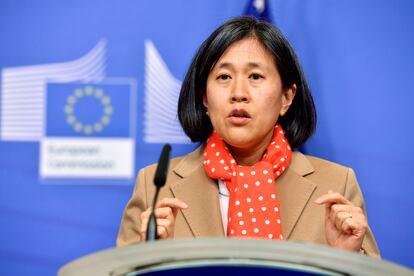To counter China, U.S. trade rep seeks closer ties to allies
The Biden administration is arguing that America’s traditional reliance on promoting free trade pacts failed to anticipate China’s brass-knuckled brand of capitalism

The Biden administration is pressing its case for a new approach to global trade, arguing that America’s traditional reliance on promoting free trade pacts failed to anticipate China’s brass-knuckled brand of capitalism and the possibility a major power like Russia would go to war against one of its trading partners.
In a speech Wednesday at American University, U.S. Trade Representative Katherine Tai is calling for a strategy of what’s known as “friend-shoring’' — building up supply chains among allied countries and reducing dependence on geopolitical rivals such as China. Rising tension with Beijing and supply-chain bottlenecks arising from the Covid-19 pandemic have highlighted the risks of relying too heavily on Chinese suppliers.
“Trade should work for the common good and help set responsible standards on labor, the environment, and other priorities that reflect American values,” Tai says in excerpts of her speech provided in advance to reporters. “It should also promote fair and healthy cooperation that lifts up workers and communities.”
The rethinking of trade goes beyond the simple issue of lowering tariffs and signing broad pacts. In her speech, Tai highlights the elimination of regulatory barriers last year that allowed U.S. farmers to export potatoes to Mexico, ongoing talks to form an Indo-Pacific Economic Framework that could possibly counter China in Asia, and the recent agreement on critical minerals with Japan.
The administration is also seeking to work with allies to reform the World Trade Organization, the Geneva-based agency that enforces global trade rules. The WTO has been crippled for more than three years: Its top appeals court hasn’t functioned since the United States blocked the appointment of new judges to the panel. The U.S. and others had argued that the WTO was ill-equipped to deal with China’s unconventional blend of capitalism and state control of the economy.
“We did not anticipate that China would end up being so globally dominant in so many ways,’’ Tai said in an interview Tuesday ahead of her speech.
When China joined the WTO in 2001, many in the U.S. assumed that it would open its economy and even allow for more political freedom. Instead, China ran up huge trade surpluses with the United States as it became a leading center of manufacturing and the world’s second-largest economy. The Chinese government took advantage of its access to the U.S. market while often discriminating against U.S. and other foreign firms. And China has continued to crack down on political dissent.
For decades after World War II, U.S. trade policy was based partly on the idea that increased global trade would reduce tensions among countries, that nations that did business with each other would not go to war. But Russian President Vladimir “Putin’s decision to invade Ukraine flies in the face of how we thought things would work,’’ Tai said.
The Biden administration has upset many of its traditional allies, especially in Europe, by keeping some of former President Donald Trump’s protectionist policies and by aggressively promoting Made-in-America manufacturing. But Tai insisted the United States wanted to work with allies to build a better, fairer world trading system.
“We are working with others and we are bringing others along with us because, frankly, that is the only way to be successful,” she said.
Sign up for our weekly newsletter to get more English-language news coverage from EL PAÍS USA Edition
Tu suscripción se está usando en otro dispositivo
¿Quieres añadir otro usuario a tu suscripción?
Si continúas leyendo en este dispositivo, no se podrá leer en el otro.
FlechaTu suscripción se está usando en otro dispositivo y solo puedes acceder a EL PAÍS desde un dispositivo a la vez.
Si quieres compartir tu cuenta, cambia tu suscripción a la modalidad Premium, así podrás añadir otro usuario. Cada uno accederá con su propia cuenta de email, lo que os permitirá personalizar vuestra experiencia en EL PAÍS.
¿Tienes una suscripción de empresa? Accede aquí para contratar más cuentas.
En el caso de no saber quién está usando tu cuenta, te recomendamos cambiar tu contraseña aquí.
Si decides continuar compartiendo tu cuenta, este mensaje se mostrará en tu dispositivo y en el de la otra persona que está usando tu cuenta de forma indefinida, afectando a tu experiencia de lectura. Puedes consultar aquí los términos y condiciones de la suscripción digital.








































